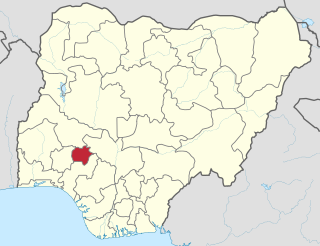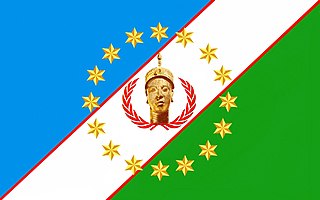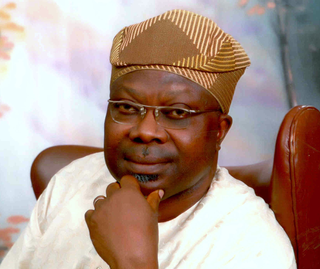
Oduduwa was a Yoruba divine king, legendary founder of the Ife Empire and a creator deity (orisha) in the Yoruba religion. His earthly origins are from the village of Oke Ora According to tradition, he was the holder of the title of the Olofin of Ile-Ife, the Yoruba holy city. He ruled briefly in Ife, and also served as the progenitor of a number of independent royal dynasties in Yorubaland.

Obatala is an orisha in the Yoruba religion that is believed to have been given the task to create the Earth but failed the task by being drunk on palm wine and was outperformed by his little brother Oduduwa. He was instead given the job of creating human beings. This was authorized by his father, Olodumare which gave Obatala the name sculptor of mankind.
"Now Olodumare [the supreme being] once called on Obatala and told him that he would love him to assist in creating human beings that would live in the world he was about to create. This is because as he (Olodumare) said further he would not like the world he was planning to create to exist without human beings."

Ifẹ̀ is an ancient Yoruba city in south-western Nigeria founded sometime between the years 500 BC and 1000 BC. By 900 AD, the city had become an important West African emporium producing sophisticated art forms. The city is located in present-day Osun State. Ifẹ̀ is about 218 kilometers northeast of Lagos with a population of over 500,000 people, which is the highest in Osun State according to population census of 2006.

Ekiti is a state in southwestern Nigeria, bordered to the North by Kwara State for 61 km, to the Northeast by Kogi State for 92 km, to the South and Southeast by Ondo State, and to the West by Osun State for 84 km. Named for the Ekiti people—the Yoruba subgroup that makes up the majority of the state's population—Ekiti State was carved out from a part of Ondo State in 1996 and has its capital as the city of Ado-Ekiti.

Osun, is a state in southwestern Nigeria; bounded to the east by Ekiti and Ondo states for 84 km and for 78 km respectively, to the north by Kwara State for 73 km, to the south by Ogun State for 84 km and to the west by Oyo State, mostly across the River Osun. Named for the River Osun—a vital river which flows through the state—the state was formed from the southeast of Oyo State on 27 August 1991 and has its capital as the city of Osogbo.

Moremi Ajasoro was a legendary Yoruba queen and folk heroine in the Yorubaland region of present-day southwestern Nigeria who assisted in the liberation of the Yoruba kingdom of Ife from the neighbouring Ugbo Kingdom.

Ọ̀rànmíyàn, also known as Ọranyan, was a legendary Yoruba king from the kingdom of Ile-Ife, and the founder of the Benin Kingdom and the Oyo Empire. Although he was the youngest of the descendants of Oduduwa, he became the prime heir of Oduduwa upon his return to claim his grandfather's throne.

The documented history begins when Oranyan came to rule the Oyo Empire, which became dominant in the early 17th century. The older traditions of the formerly dominant Ile-Ife kingdom are largely oral.

The Yoruba people are a West African ethnic group who mainly inhabit parts of Nigeria, Benin, and Togo. The areas of these countries primarily inhabited by the Yoruba are often collectively referred to as Yorubaland. The Yoruba constitute more than 50 million people in Africa, are over a million outside the continent, and bear further representation among members of the African diaspora. The vast majority of the Yoruba population is today within the country of Nigeria, where they make up 20.7% of the country's population according to Ethnologue estimations, making them one of the largest ethnic groups in Africa. Most Yoruba people speak the Yoruba language, which is the Niger-Congo language with the largest number of native or L1 speakers.
Isin is a Local Government Area in Kwara State, Nigeria. Isin Local Government Area of Kwara State was created from the old Irepodun Local Government Area in 1996 with the headquarters at Owu-Isin. It has an area of 633 km2 and a population of 59,738 at the 2006 census.
Okitipupa is in Nigeria and part of the Ikale-speaking nation in Ondo State. Okitipupa Government headquarter is located in Okitipupa Major town with a university, Olusegun Agagu University of Science and Technology (OAUSTECH) which commenced academic sessions in 2010–11.
Ife North is a Local Government Area in Osun State, Nigeria. Its headquarters are in the town of Ipetumodu in the north of the area at7°31′00″N4°27′00″E.
Ife South is a Local Government Area in Osun State, Nigeria. Its headquarters are in the town of Ifetedo at 7°11′00″N4°42′00″E.

Iyiola Ajani Omisore is a Nigerian businessman, engineer, and politician who served as deputy governor of Osun State from 1999 to 2003. Subsequently, he served as a member of the Nigerian Senate for Osun East from 2003 to 2011. He is a former national secretary of the All Progressives Congress.
Alayeluwa Oba Okunade Sijuwade CFR was the fiftieth traditional ruler or Ooni of Ife from 1980 to his death in 2015, taking the regnal name Olubuse II. He was a traditional ruler of Ile-Ife, Yoruba town in Osun State, Nigeria. He was crowned on 6 December 1980 in a ceremony attended by the Emir of Kano, Oba of Benin, Amayanabo of Opobo and Olu of Warri, as well as by representatives of the Queen of the United Kingdom.
Ipetumodu () is a city in Osun State, in the southwestern part of Nigeria. It is the headquarters of the Ife North local government area. The city is under the leadership of traditional ruler with the title of Apetumodu, which means "one who killed an antelope for sacrificial purposes for Odu".

Obalufon Alayemore, also referenced as Ọbalùfọ̀n II or just Alayemore, was the Third Ooni of Ife, a paramount traditional ruler of the Ife Empire. He succeeded his father Obalufon Ogbogbodirin. Obalufon Alayemore was forced out of power by Ooni Oranmiyan and later returned with the help of local residents to reclaim the throne.
The Isha sometimes spelt Ica, and Itcha are a relatively small group of the Yoruba people, situated in the western parts of middle Benin, West Africa, especially in the town of Bantè and other surrounding communities in the Collines Department.

The Ife Empire was the first empire in Yoruba history. It was founded in what is now southwestern Nigeria and eastern Benin. The Ife Empire lasted from 1200 to 1420. The empire was formed by Odùduwà, and became well-known for its sophisticated art pieces. Although Yoruba was the main language of the empire, there were also various spoken dialects and languages. It rose to power through trade with Sahelian and forest states. Its capital city, Ilé-Ife, was one of the largest urban centers in 14th century West Africa.














